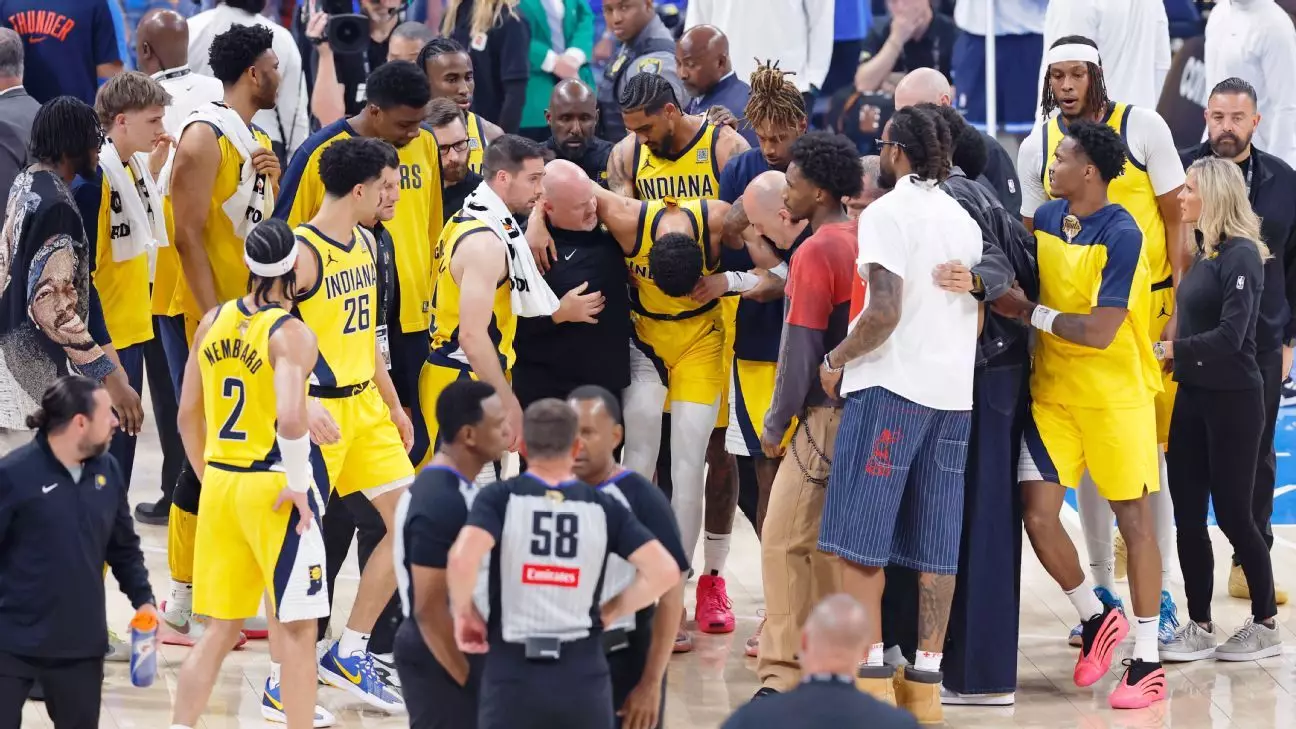In a world where athletic prowess and sheer determination are idolized, Indiana Pacers star Tyrese Haliburton’s recent ordeal brings forward pressing questions about sacrifice in sports. Haliburton’s insistence on playing through a painful calf strain is both commendable and bewildering, culminating in a devastating Achilles tear that robbed him of a chance at glory in the NBA Finals. His emotional social media statement sends a poignant yet troubling message: the relentless devotion athletes have to their teams and cities, even at the expense of their long-term health, is a double-edged sword.
While Haliburton radiates a courageous spirit, proclaiming, “I’d do it again, and again after that,” it also begs a severe critique of the culture surrounding sports. Should players feel obligatingly compelled to risk injury for the sake of victory? His decision is notably noble, but we must ask: is this heroism or reckless abandonment of one’s well-being?
The Culture of Sacrifice in Sports
Haliburton’s injury punctuates a recurring theme within professional sports: the glorification of playing through pain, often encouraged by fans, coaches, and media alike. This mentality can exert immense pressure on athletes, leading them to prioritize their loyalty over their physical viability. Too often, athletes are lauded for their ‘grit’ while the human cost becomes an afterthought. Haliburton reveals, “Words cannot express the pain of this letdown. The frustration is unfathomable.” This pain is not merely physical; it’s psychological and emotional, stemming from the realization that a single moment of valor could turn into an extended period of rehabilitation and uncertainty.
Moreover, Haliburton isn’t alone in this ordeal. He became the third star during these playoffs to suffer a torn Achilles while pushing through pain. The trend raises eyebrows at how the league and its culture might be influencing these decisions. Scripted narratives about toughness coalesce into a pressure cooker where athletes may feel they have little choice but to perform, regardless of potential consequences. The crux of the issue, then, lies in the balance between dedication and self-preservation.
Understanding the Burden of Expectations
There’s something deeply human about Haliburton’s emotional response to his injury—a rawness that many can relate to in various walks of life. In the spotlight of sports, the pressure to achieve, the burden of expectations, and the relentless drive to succeed can become heavy weights to bear. Haliburton’s acknowledgment of his mental state is remarkably candid: “My foot feels like dead weight fam. But what’s hurting most… is my mind.” His transparency in addressing his mental health amidst the chaos of professional sports serves as a crucial reminder.
There’s an unspoken pain that lies beneath the surface; it’s the weight of missed opportunities and the struggle to redefine one’s purpose when faced with setbacks. Haliburton’s public admission could pave the way for greater discussions about athlete welfare, mental health resources, and self-advocacy in a passionate community that too often romanticizes suffering.
The Uncertainty Ahead and a Call for Change
As the Pacers confirmed Haliburton’s torn Achilles, the uncertainty of the upcoming season looms heavily. Expected to miss the entirety of the next season, Haliburton’s fortitude shines through as he states that he will ‘get through this.’ Still, one cannot help but ponder if this resilience is necessary or even healthy. Should athletes be driven to express gratitude for their suffering? The mantra “I don’t ‘have to’ go through this, I get to go through this” resonates with an inspirational tone, but it veers dangerously close to glorifying pain rather than addressing systemic issues within professional sports.
What Haliburton and others need is not just the ability to ‘come back stronger,’ but a cultural shift that values long-term health over short-term gain. This journey through physical rehabilitation should not only be about physical recovery but mental wellness—that deep-rooted need to foster a supportive environment for athletes that transcends mere performance metrics.
In a sport that thrives on the narratives of triumph and resilience, we must not forget the human cost incurred for those very stories to unfold. Haliburton’s ordeal should serve as a catalyst for reflection. After all, in a game filled with moments of greatness, we must not sacrifice our humanity on the altar of athletic achievement.


Leave a Reply